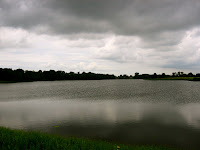I'm spending the month of July in Klaipeda, Lithuania and
I will be blogging the experience. Some posts will be intentional but a lot of it will be stream of consciousness. I chalk up any terrible culturally insensitive things I may say to jetlag. Enjoy the journey with me!!

The other day I visited the village of Kretinga. Kretinga is a small town. For once, this isn't deceptively so. Most "small towns" in Lithuania aren't. This fact comes mainly from the still very high population density. Most people still live in Soviet era apartments, which while they look extremely decrepit are actually very nice. The buildings are run like co-ops so any

cosmetic work falls to the wayside until it becomes unbearable. Residents won't collectively shell out the money otherwise.
HOWEVER, I digress. I went to Kretinga this past weekend. Kretinga is the childhood home of my Grandmother. She didn't grow up in town, but lived in the farmlands surrounding the city. I wasn't able to make any prior contact so I arrived in town under the radar and not really knowing ANYTHING about Kretinga or my grandmothers relationship to it. This visit was the bare minimum of "ancestral exploration." I was shoved into it very enthusiastically by Kel, a man from New Zealand (with very red hair)

who currently lives in Klaipeda. He was adamant that I needed to visit Kretinga and was also very disappointed that I hadn't done more homework. The difficult thing about trying to connect ancestral dots is that in all the regime change and government turnover, centralized records can be hard to find. I would have needed to really dig in advance, and now that I know the country a little better, there isn't much keeping me from potentially coming back.
I wouldn't say that the ghost of my Grandmother walked before, it wasn't that emotional or visceral. However, I was able to imagine her walking down some of the same broad thoroughfares that I did. I found an evangelical lutheran church, which was her denomination. For all I know she might have attended it. ....I have to admit this doesn't sound like the deep and emotional

narrative one would expect with visiting a very important piece of my personal history. Though I suppose to a certain extent history is like that sometimes. Routinely the most mundane things end up being meaningful. I don't mean to imply that Kretinga is mundane, or my grandmothers life was mundane for that matter. Far from it...the woman worked two night jobs and raised two boys in inner city chicago...alone. This of course, was AFTER being ripped from her home to forcibly work for the Germans in a labor camp. History, while extremely important and significant usually lacks that cinematic quality we like to impose upon it.
History grounds individuals and societies. There is an implicit understanding that with an understanding of history comes a greater understanding of how each of us is connected to a narrative that is bigger than ourselves. This point was driven home for me especially while walking around Kretinga. My life is very much the product of intentional and unintentional choices made by others. And their life comes from the same cascading reality. Life has a tendency to bubble forth like a pot of noodles you shouldn't have covered while boiling. History can help us make sense of Life's randomness. It can help draw some contours and give shape to something that might have originally been thought to be formless and amoeboid.
I wish more of my friends had an opportunity to walk in the footsteps of their ancestors. My generation has known nothing but rapid social and technological change. Few other generations in history have witnessed the sorts of transformations I seem to bump into every 4 years or so. We're an unsentimental lot, but that doesn't mean we can't connect to a larger narrative or an older and subtly relevant time. I'm very glad that I visited Kretinga. You can see more pictures of it here.

0 comments:
Post a Comment